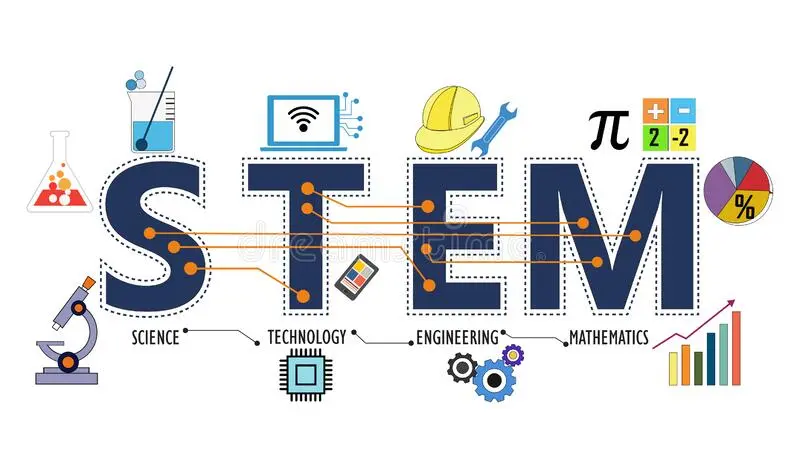What are the best college majors, and are there any programs of study that are important for the future? People often say that the best college major should align with a person's interests. However, simply being passionate about a particular field of study may not sustain an individual in the future. There are college majors that offer more stable job security for students. The 10 best college majors for the future include promising career paths for today's students.
See: Top 10 Computer Science Universities in the World According to the QS World Rankings
Questions about future specializations
In the section below, we'll attempt to answer the most important questions about future majors, the best university majors, and what you need to do to qualify for these programs and enter the job market.
What is a good graduation rate?
STEM (science, technology, engineering, and mathematics) jobs are expected to grow significantly over the next eight years. Many organizations, such as the BLS, predict that 10.5% increase In STEM occupations, compared to a 7.5% increase in non-STEM occupations.
What is the best major in the world?
The best grade can vary from student to student. Many students may find a subject or field they are immediately interested in. For students who are undecided, taking a variety of courses and meeting with an advisor may be a good option.
What are the most in-demand majors in the future?
The BLS projects an increase in STEM (science, technology, engineering, and mathematics) degrees over the next eight years. Students can explore degrees in science, technology, engineering, and mathematics. Many of these degrees offer specializations that may interest students.
Read: أفضل الدول للدراسة في أوروبا 2026 ( قائمة أهم 10 دول)
What are the most important university majors?
Required degrees can vary depending on economic trends and needs in specific industries. The Bureau of Labor Statistics lists the percentage of job growth expected over a 10-year period for each occupation on their website. Many fields are experiencing significant growth during this time.
Science, technology, engineering and mathematics fields are growing. بأسرع وتيرة ، ولكن هناك وظائف أخرى تشهد أيضًا نموًا مرتفعًا. التمريض ، على سبيل المثال ، من المتوقع أن ينمو بنسبة 9٪ من 2026 إلى 2030. وتشمل الدرجات الأخرى المطلوبة بشكل خاص المعالجين الفيزيائيين بزيادة 21٪ في العقد القادم ، والمساعدين الطبيين بزيادة 18٪ ، وفنيي الطائرات وإلكترونيات الطيران ، مثل وكذلك مديري الإنشاءات بزيادة قدرها 11٪.
What are the best university majors?؟
Trying to figure out what you can study in college that will be relevant in the long run is challenging, especially given the rate at which the world is changing. With new industries emerging and new technologies rapidly evolving, many of the jobs currently in demand could become obsolete in a very short period of time.
Students today must choose a major that not only paves the way for a career they'll enjoy, but also one that offers a steady salary, job security, and a sense of accomplishment once they achieve their career goals. But what types of education will be in demand in the coming years?
The most popular fields of study are those that address ongoing societal demands. Professionals in the medical and engineering fields will always be in demand. Although the nature of the work and the people involved may change, these professions will not disappear. Employers are more likely to hire graduates from schools where there is a demand for their services but a shortage of qualified candidates.
ما هي أفضل تخصصات المستقبل شهرة في الجامعات في عام 2026؟ نظرنا في البيانات والمقابلات وبيانات الأجور وتوقعات التوظيف وعوامل أخرى لتحديد أفضل 10 تخصصات لطلاب الجامعات. دعونا نلقي نظرة عليهم!
10. Computer Information Systems Specialization
Computer science majors are gaining popularity and employment potential, and are certainly among the top college majors. However, not all computer science majors are equally recognized. Among the most in-demand jobs are those for graduates of management information systems degrees. There are universities and colleges that offer a bachelor's degree in computer information systems. Academic studies typically take three years to complete, but can take up to four years, including internships.
عادةً ما يعمل الأشخاص الذين يتخرجون بهذا التخصص في مجال تكنولوجيا المعلومات للشركات الكبيرة. معدل البطالة الحالي هو 5-7 في المئة. يبلغ متوسط دخلهم السنوي حوالي 60 ألف دولار ، والنمو المتوقع في التوظيف في عام 2026 هو 18 في المائة.
9. Chemical Engineering Major
Engineering is a field in the spotlight these days. One field that promises a bright future for students is chemical engineering. This is offered as a bachelor's degree at a number of colleges and universities. The degree program primarily deals with biology, chemistry, and physics.
يتم تعيين مهندسين كيميائيين في كبرى الشركات التي تشمل شركات الأدوية والمختبرات. متوسط معدل البطالة لديهم هو 4 إلى 7 في المئة. إنهم يتقاضون رواتب عالية من خمسة أرقام بمتوسط دخل قدره 75000 دولار. نمو العمالة المتوقع بحلول عام 2026 هو 6 في المائة.
8. Medical assistance specialization
More hospitals and other healthcare providers are hiring physician assistants every year. The job offers sustainability and growth, with certificate programs that can lead to higher positions. This major is offered at many colleges and universities across the country. The major leads to an associate's degree and is typically completed in two years. It opens the door to careers in healthcare.
المساعدين الطبيين مسؤولون في الغالب عن تنفيذ أوامر الطبيب. عادة ما يعملون في المستشفيات ويضطلعون بمهام تتطلب مهارات إكلينيكية وإدارية. يبلغ معدل البطالة الحالي لديهم حوالي 3 إلى 5 في المائة في جميع أنحاء البلاد. عادة ما يكون التعويض السنوي للمساعد الطبي حوالي 50000 دولار ، ونمو التوظيف المتوقع بحلول عام 2026 هو 13 بالمائة.
7. Medical Technology Specialization
Medical technologist employment rates are on the rise. This is another healthcare career with a promising future for current students. Medical technology is offered through a bachelor's degree program at many universities and colleges. Studies include biology, chemistry, and clinical laboratory science.
غالبًا ما يجد الخريجون وظائف في المستشفيات والمختبرات. ينخفض معدل البطالة الحالي لديهم من 2 إلى 4 في المائة. يبلغ متوسط رواتب أخصائيي التكنولوجيا الطبية حوالي 50000 دولار مع نمو متوقع بنسبة 13 في المائة بحلول عام 2026.
6. Electrical Engineering major
Electrical engineering may not be an easy college major, but it comes with high job opportunities and potential compensation. This is a bachelor's degree that takes four years to complete. There are also master's and doctoral degrees offered at universities.
يجد مهندسو الكهرباء وظائف في العديد من الشركات الكبرى في جميع أنحاء البلاد. هم مطلوبون في محطات توليد الكهرباء ومنشآت التصنيع الكبيرة والشركات الكبرى الأخرى. يتراوح معدل البطالة لديهم بين 5 إلى 7 في المائة بمتوسط راتب يبلغ حوالي 60 ألف دولار. النمو المتوقع في توظيف المهندسين الكهربائيين بحلول عام 2026 هو 6 بالمائة.
7. Construction Management Specialization
Construction management is another college degree with high employment demand. This degree is offered at many colleges and universities across the country. Construction management programs can be either bachelor's, master's, or doctoral. A bachelor's degree program typically takes three to four years to complete.
مديرو البناء هم الذين يتحكمون في عمليات البناء. ينخفض معدل البطالة لديهم عند حوالي 5 في المائة فقط ، وراتبهم السنوي حوالي 50 ألف دولار. نمو العمالة المتوقع بحلول عام 2026 هو 17 بالمائة.
8. Nursing major
The employment rate for nurses has been steady in recent years. However, the rapid growth in the newborn and aging population is also creating a demand for more nurses. This profession requires an associate's or bachelor's degree to work as a licensed nurse. An associate's degree can be completed in two to three years, while a bachelor's degree takes four years to complete. Nursing is one of the top college majors.
لدى الممرضات معدل بطالة منخفض يبلغ 4 في المائة ويتقاضى راتبًا متوسطًا قدره 60 ألف دولار. هم في الغالب مطلوبة في المستشفيات ومرافق الرعاية الصحية الأخرى. يبلغ النمو المتوقع لمعدل توظيفهم 26٪ بحلول عام 2026.
9. Physical Therapy Specialization
Obtaining a degree in physical therapy can be challenging. However, the end result is highly rewarding for physical therapists. Physical therapy degrees include bachelor's, master's, and doctoral degrees. The simplest is the bachelor's degree, which can be completed in four years. This degree program primarily deals with biology, anatomy, and other health sciences.
يمكن أن يجد المعالجون الفيزيائيون الكثير من الفتحات في المستشفيات ومراكز إعادة التأهيل. لديهم معدل بطالة منخفض من 2 إلى 5 في المائة. يبلغ الراتب المتوسط حوالي 60 ألف دولار مع زيادة متوقعة في التوظيف بنسبة 33 في المائة بحلول عام 2026.
10. Aviation Science and Aviation Technology
Aviation and aeronautical technology is another field that poses significant challenges for many students when it comes to academics. However, graduates in this field of study earn a good salary. There are also excellent growth opportunities for those working in this field.
Many universities across the country offer degrees in aviation and aeronautical technology. Some degree programs prepare students to become pilots, while others focus more on engineering. Various degree programs address aerodynamics and mechanics.
يحصل الأشخاص الذين يعملون في شركات الطيران ومصنعي الطائرات على راتب متوسط قدره 60 ألف دولار وما فوق. معدل البطالة لديهم هو 4 في المائة فقط مع نمو متوقع بنسبة 5 في المائة بحلول عام 2026.
11. Pharmacology major
The first of the top college majors, and among the highest earners currently, are those with degrees in pharmacology. This requires at least a bachelor's degree, and salary ranges improve as one attains higher degrees. Bachelor's degrees are offered at many colleges and universities and mostly deal with drugs and their interactions.
غالبًا ما يكون الصيادلة مطلوبين في المختبرات الصيدلانية والصيدليات والمستشفيات. يحصلون على راتب متوسط قدره 105000 دولار اعتمادًا على مستوى درجتهم وخبرتهم. ينخفض معدل البطالة لديهم إلى 3 في المائة مع نمو متوقع بنسبة 25 في المائة في التوظيف بحلول عام 2026.










